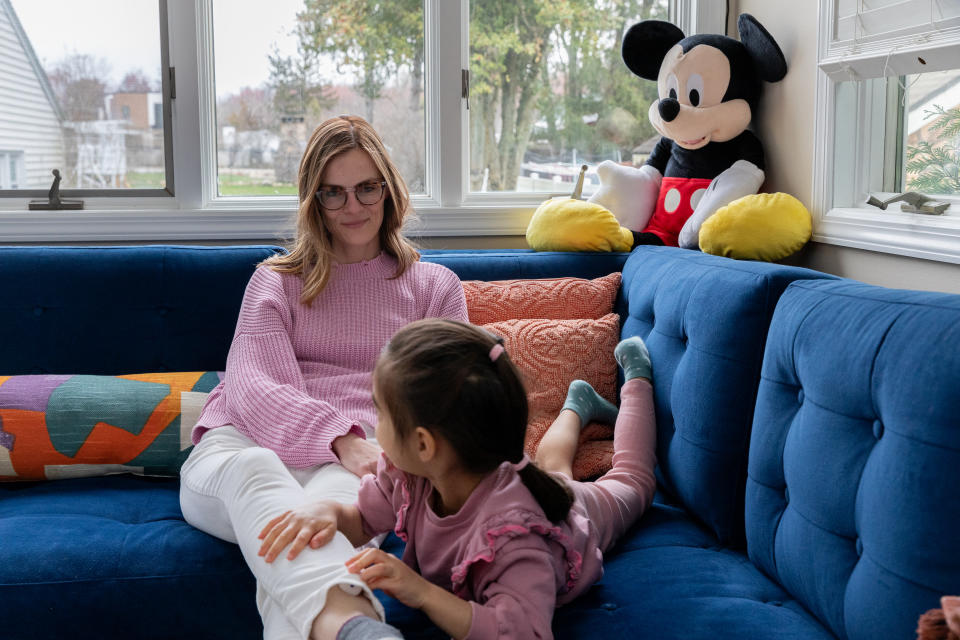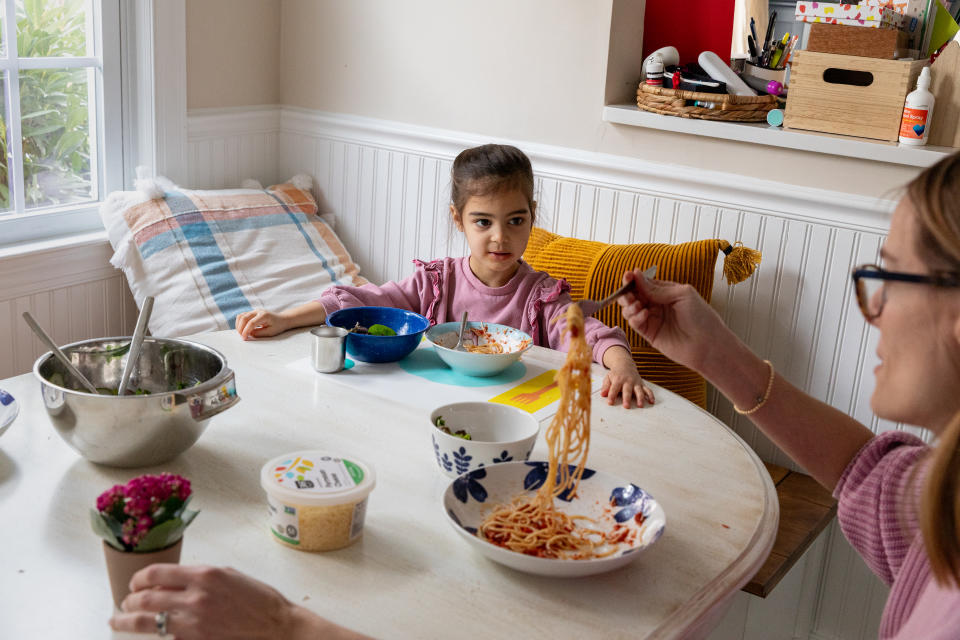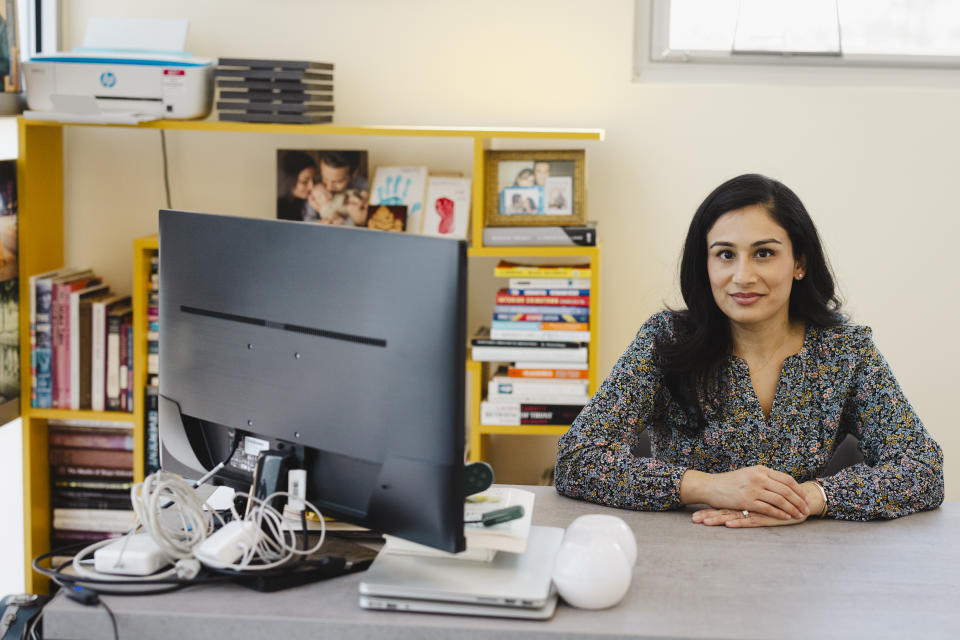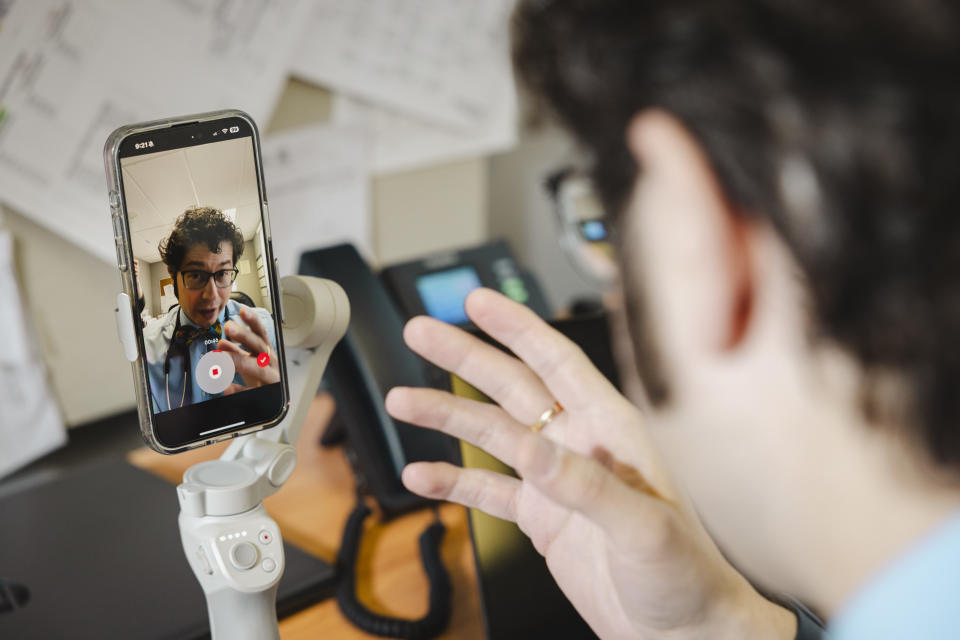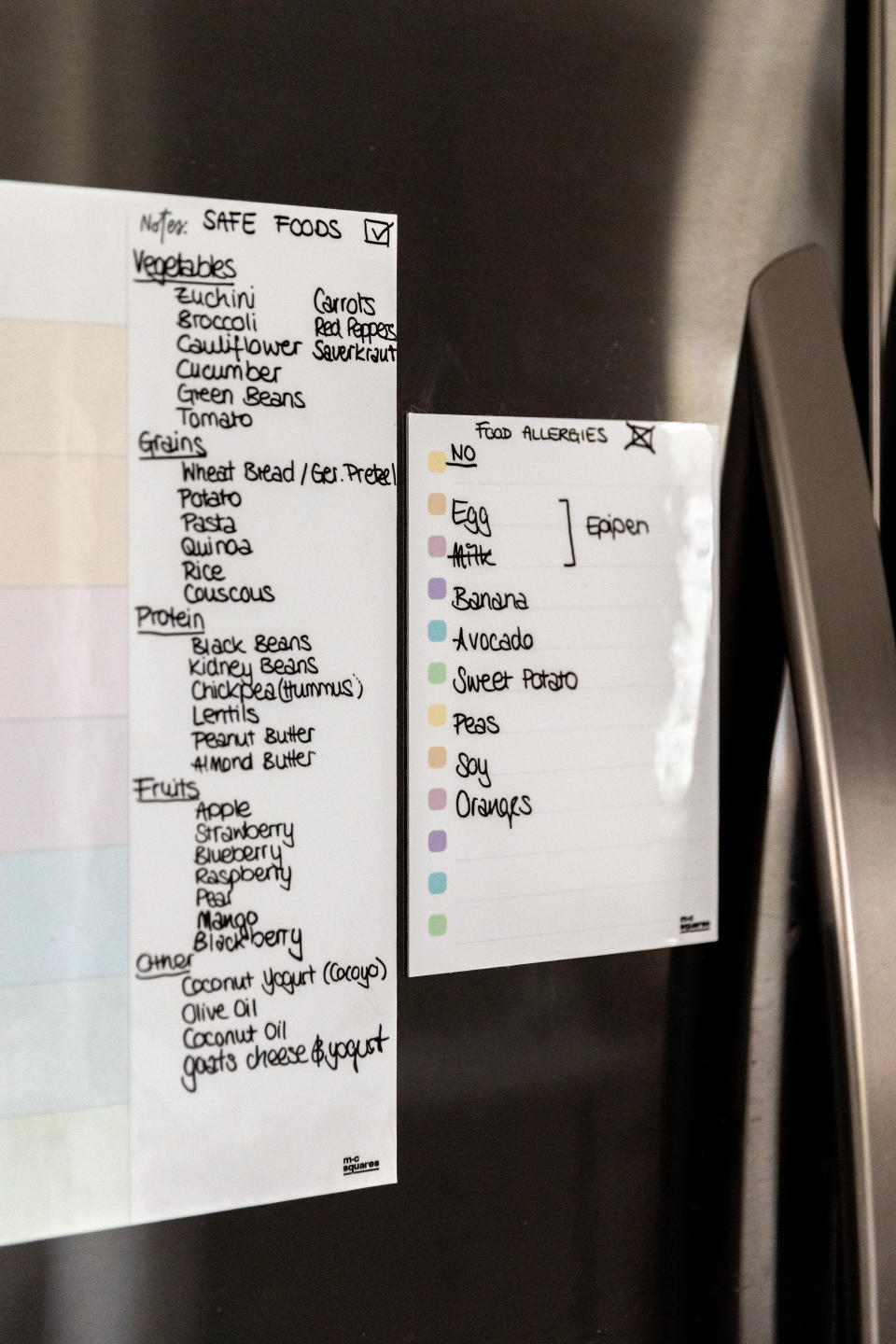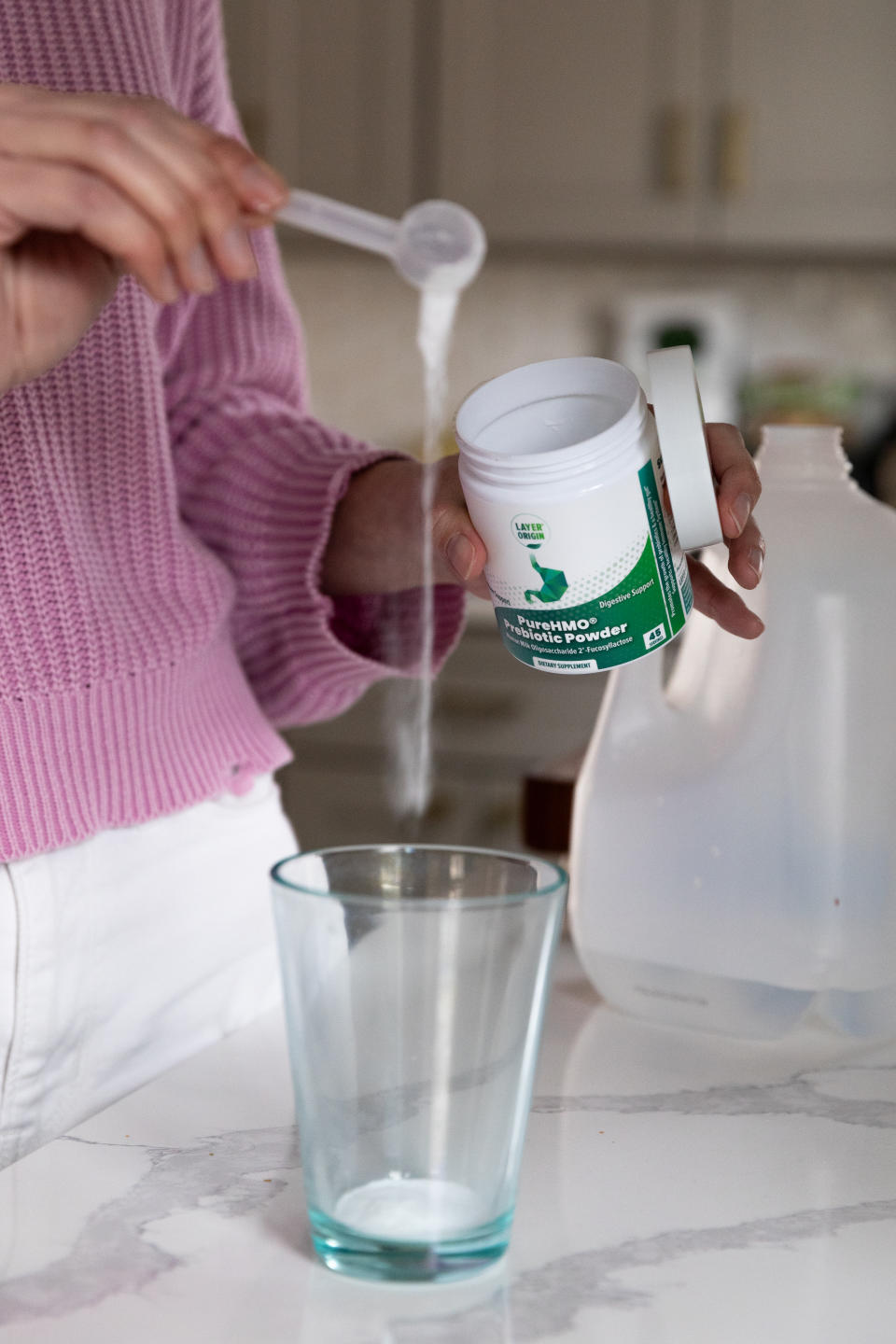Doctors couldn’t help. They turned to a shadow system of DIY medical tests.
Angelika Sharma was desperate. An array of basic first foods - from bananas to sweet potatoes - caused her six-month old Annika to vomit uncontrollably, so many times in one night that she landed in the hospital for dehydration.
Half a dozen pediatric specialists largely dismissed her daughter’s ailments, Sharma said, forcing her to leave her job as a hospitality executive, because "you can’t just have any babysitter looking after a child” with such serious reactions to food.
After a year and a half, an answer came finally in the form of a Facebook ad for Tiny Health, a Silicon Valley start-up that could test her baby’s gut microbiome. Using a bead of stool swabbed from a diaper, the company diagnosed the problem: Annika’s gut was overcrowded with P. vulgatus, a common bacteria. A company nutritionist recommended a probiotic, sauerkraut and exposure to animal microbes through daily visits to the petting zoo.
Within months, Annika’s food reactions were normal. More tests showed a gut transformed.
A new world of DIY testing is changing the relationship between physicians and patients, allowing people like Sharma to bypass the doctors office and take medical tests on their own. Buoyed by a growing network of independent labs, Silicon Valley start-ups now offer tests for a battery of conditions including menopause, food sensitivity, thyroid function, testosterone levels, ADHD and sexually-transmitted diseases. The growth is fueled by a growing distrust of Big Medicine and confidence in home-testing borne from the Covid pandemic.
A public eager for answers is swarming this parallel medical ecosystem. The home diagnostics market generates $5 billion annually and is expected to nearly double by 2032, according to the market research firm Precedence Research.
Venture capitalists and entrepreneurs told The Post that they envision a world where frequent at-home testing is a routine part of life, enabling everyone to become “the CEO of their own health," said Luca Springer, who co-founded a Silicon Valley start-up that aims to make cancer testing as simple as a home-pregnancy test.
Patients in remission from cancer, for example, could use urine strips to check if the disease has returned, he said, confirming the results with their doctor. He noted that at one time home pregnancy tests were considered scandalous and that most cancers are still detected way too late.
But the boom angers some doctors, who argue that circumventing their offices can lead to questionable remedies, misdiagnosis or delayed medical care.
While many home tests are standard diagnostics - shifted from a lab to the living room - others straddle the line between medicine and wellness. In this gray zone, incremental scientific innovations can be quickly funded, brought to market and peddled to consumers online before their health benefit has been proved.
Patients said the testing industry offers a rare path to relief, but many see a dangerous Wild West of medical information.
“Home-testing companies and influencers are creating a market preying on people’s very normal concerns about their health,” said Karen Tang, a gynecologist in Pennsylvania who has urged caution around home hormone and fertility tests to her large following on TikTok.
The tests often fall into a regulatory gap. While the U.S. Food and Drug Administration generally reviews all but the lowest-risk medical tests, it doesn’t supervise “wellness” tests marketed directly to consumers. Other start-ups avoid stringent FDA review by having physicians oversee some part of the testing process - creating what experts call a two-track system of standards.
It’s likely that some companies break the rules entirely, evading the agency and betting it won’t police a fast-growing market, said Alberto Gutierrez, a former senior FDA official.
Some professional societies have cautioned against taking certain home tests. The American Gastroenterological Association says data on the health benefit of biome tests is “lacking.” The American Diabetes Association says that no off-the-shelf glucose tests for measuring signs of diabetes meet “nationally standardized criteria for accuracy.”
Yet the draw of these companies is that they offer options to those feeling let down by conventional doctors. Sharma credits Tiny Health’s gut biome test, which was developed by a Mayo Clinic microbiologist but not approved by the FDA, with providing “a mind-blowing tool you can’t get from the traditional medical establishment."
The FDA is starting to pay attention: Regulators finalized a contentious rule in April to begin holding lab-made tests to the same standards as conventional ones, phasing out a historically hands-off position in response to the ballooning industry.
Still, businesses are charging ahead. Y Combinator, the prominent start-up incubator, funded Springer’s Cleancard last year. Function Health, a start-up founded by a Cleveland Clinic doctor in 2022, sells a $499 out-of-pocket membership offering more than 100 different lab-drawn tests, including for heart health, immunity and toxins. CVS and Walgreens enlisted San Francisco start-up ixlayer in 2022 to offer home tests for sexually-transmitted diseases, kidney function, diabetes and cardiovascular disease. Testing giant LabCorp recently launched a line of basic home-test kits called LabCorp OnDemand.
A bevy of lifestyle and wellness influencers help the companies promote their products online. Everlywell, an eight-year-old start-up offering more than two-dozen home tests, has a dedicated team to analyze Americans’ Google searches, determining which ailments it should target with tests.
Companies see a major opportunity in the sea change of health habits triggered by the covid-19 pandemic, said health-tech investor Christina Farr. As millions of Americans swabbed their own nostrils and Zoomed with doctors for the first time, mistrust in scientific authorities ballooned. Many sought to fill gaps in medical information and care with independent research, often aided by online communities.
And affluent tech-oriented consumers expect to be hands-on with their health, embracing a fleet of products such as longevity apps, Oura smart rings, full-body MRIs and other sensors to track and optimize the body.
Disha Narang, an endocrinologist and obesity medicine specialist at Endeavor Health, a health system in Chicago, said that in recent years, “more and more” patients are coming into her clinic with “menus” of results from tests that they have taken on their own.
“I say, I’m not a restaurant!” said Narang, who puts “zero stock” in the tests because she cannot verify their accuracy.
Narang said she understands that many who feel neglected by the medical system are driven to take matters into their own hands. But the solution often makes the problems worse, spawning a “vicious cycle” of unnecessary testing, spending and anxiety - adding to burdens on patients and caretakers.
“I get that it’s empowering,” she said. “But it’s a fine line.”
- - -
An exploding online market fueled by distrust
On TikTok and Instagram, the shadow ecosystem of self-testing is fueled by algorithms and influencers - and feeds off lost trust in “Big Health.”
Crystal Jung, a natural health and beauty influencer from Nashville, developed chronic “10 out of 10” pain after her daughter was born 13 years ago. While consulting more than a dozen specialists, she was struck by providers’ disinterest in unraveling the cause of her condition.
The 44-year-old switched to holistic medicine seven years ago, and says she has been able to heal herself with diet, supplements, fasting and acupuncture. She’s stopped going to traditional doctors for her autoimmune issues entirely, relying instead on at-home blood tests from the company LetsGetChecked to monitor thyroid stimulating hormone, a metric her doctors refused to check, she said.
“The number one thing I hear from other women is that they’re tired of being gaslit by doctors,” Jung said.
She is also a LetsGetChecked advertising partner. Jung estimates she has earned $20,000 from promoting blood tests from the company for thyroid health, micronutrients and female hormones.
Julia Cheek was motivated to found Everlywell in 2015 after accruing thousands of dollars in out-of-pocket testing costs for unexplained body aches.
Her fledging start-up got exposure from an appearance on the TV show “Shark Tank” two years later, but its real boost came when Everlywell became the first company to get FDA authorization for a stand-alone covid-19 self-collection kit. Investors such as BlackRock and Lux Capital poured $250 million into the start-up, enabling it to expand its offerings as the public’s comfort around testing swelled.
Everlywell works with 20- and 30-something lifestyle influencers to sell its tests, some of which are marketed as wellness diagnostics that don’t need FDA approval. For its medical tests, which would otherwise require the FDA to weigh in, the start-up has a network of doctors who review results virtually - a practice that appears to help the company avoid the strict FDA approval process known as premarket review.
But social media platforms are also becoming battlegrounds where doctors raise alarms about the testing boom.
Zachary Rubin, an allergy doctor in the Chicago suburbs with 1.2 million TikTok followers, has made TikTok videos warning patients against taking at-home food sensitivity and allergy tests sold by Everlywell and other companies. He says such sensitivity tests - which screen for antibodies the body produces in response to consuming certain foods - merely indicate a tolerance to something someone eats regularly.
“People go for years thinking they have a diagnosis when they don’t have one,” he said. “They end up eliminating certain foods and possibly developing allergies as a result.” In rare cases, he added, patients have become malnourished after radically altering their diets in response to the tests.
Everlywell is facing a class action lawsuit charging that its claims about food sensitivity tests are misleading marketing. The American Academy of Allergy, Asthma and Immunology also warns people not to use these home tests. Everlywell declined to comment on pending litigation, but said its tests are backed by clinical research.
“Peddling of health-care wares directly to patients [makes it] pretty tough for them to discern the difference between a legitimate test or not,” said Bob Wachter, chair of the department of medicine at the University of California at San Francisco.
Wachter, who is an adviser to health-tech start-ups, says the explosion of self-testing is a promising way to address gaping shortfalls in the medical system, but there’s “a lot of snake oil.”
Regulators vs. innovators
The FDA made a fateful decision in 1976 when it imposed new regulations for medical devices. Tests made by conventional manufacturers would have to undergo an intensive review to demonstrate they work before they can be used on patients. But tests made and analyzed in a single laboratory - a much smaller universe at the time - would be off the hook.
As the market for lab tests has exploded, including for life-threatening conditions, the FDA has started to raise alarms. In a 2015 report, the agency warned that the rising volume and complexity of new tests creates a risk “that patients will be harmed - and, in fact, have been harmed - and highlights the need for appropriate oversight.”
Agency scientists have recently called the current situation outdated and “untenable.” In a memo listing health concerns on lab-developed tests, the FDA cited a company that sought approval for its test diagnosing Alzheimer’s disease. The FDA declined to authorize it, saying it lacked data to support its accuracy. That test is still being offered to patients, said the memo, thanks to the FDA’s hands-off policy.
A new FDA rule will phase in a process that would require certain lab-developed tests to undergo a rigorous review before hitting the market, meet manufacturing standards and report bad patient outcomes. Opponents say the rule would stifle innovation, and Everlywell has argued it could significantly limit access to critical tests to people in medically underserved areas.
Many investors and entrepreneurs endorse self-testing with similar urgency. Tiny Health founder Cheryl Sew Hoy said she raced to develop her baby microbiome testing start-up because of her experience giving birth to a C-section baby with gastrointestinal issues that doctors could not address. Though she and her business partners were aware that the benefits of gut bacteria testing have often been overhyped, they found cutting-edge research showing that the simplicity of a baby’s gut makes it highly responsive to interventions.
To them, it did not seem fair to wait for years - possibly decades - until that research could become standard pediatric advice.
“It will eventually get to the point where you get screened with a stool test every time you go to the hospital, but that’s not going to happen next year or the next couple of years,” said Ruben Mars, a microbiologist at the Gut Microbiome Laboratory at the Mayo Clinic, and a scientific adviser to Tiny Health. “But these kids are getting chronic disease now. … They shouldn’t have to wait until it becomes standard of care.”
As long as the medical system remains slow there is going to be a market for people who take matters into their own hands, said Anarghya Vardhana, a Silicon Valley investor. “If you don’t give patients the tools, they will go figure it out themselves,” she added.
Related Content
One graduate’s quiet protest: Bringing a banned book to commencement
The real dolphin tale: They’re smart, sometimes vicious and highly sexed

